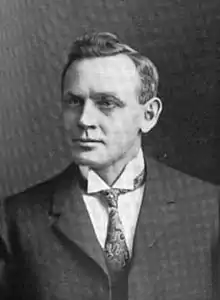Frank Edgar Scobey
Frank Edgar Scobey (1866–1931) was Director of the United States Mint from 1922 to 1923.
Frank Edgar Scobey | |
|---|---|
 Frank Edgar Scobey | |
| Director of the United States Mint | |
| In office March 1922 – September 1923 | |
| President | Warren Harding Calvin Coolidge |
| Preceded by | Raymond T. Baker |
| Succeeded by | Robert J. Grant |
Biography
Frank Edgar Scobey was born in Miami County, Ohio on February 27, 1866, the son of William Scobey and Martha J. (Vandeveer) Scobey.[1] He attended public schools in Troy, Ohio.[1]
After school, Scobey secured a position as Troy agent for Standard Oil.[2] Scobey later fell ill and sold his business, spending three full years traveling to try to improve his health, wintering in Florida and Texas.[2] He married Mayme Barrington of Covington, Ohio on May 7, 1889.[2] He formed a livery business with his uncle, J. F. Vandeveer, in 1894.[2]
As a young man, Scobey was active in the Miami County Republican Party.[1] In 1897, he was elected sheriff of Miami County. He was re-elected, holding office until his resignation in January 1902.[1]
A supporter of U.S. Senator Joseph B. Foraker, Scobey then became Clerk of the Ohio Senate through Foraker's influence.[3] During this period, Scobey became a personal friend of Warren G. Harding, who was a member of the Ohio Senate from 1899 to 1903.[4] Scobey maintained a correspondence with Harding even after Scobey moved to San Antonio in 1907 to found the Scobey Fireproof Storage Co.[5]
When Harding became President of the United States in the 1920 U.S. presidential election, he appointed Scobey Director of the United States Mint.[5] He held that office from March 1922 until September 1923.
Scobey died in San Antonio in 1931.
References
- Mercer, James Kazerta; Rife, Edward K. (1903). Representative Men of Ohio, 1900-1903. J. K. Mercer.
- Thomas C. Harbaugh, Centennial History of Troy, Piqua, and Miami County (Chicago: Richmond-Arnwed Publishing Co., 1909)
- "Texas "Mystery Man" to Entertain Harding", The New York Times, Nov. 4, 1921
- "Texas "Mystery Man" to Entertain Harding", The New York Times, Nov. 5, 1920
- Robert K. Murray, The Harding Era (Toronto: Copp Clark Publishing Co., 1969), p. 21
